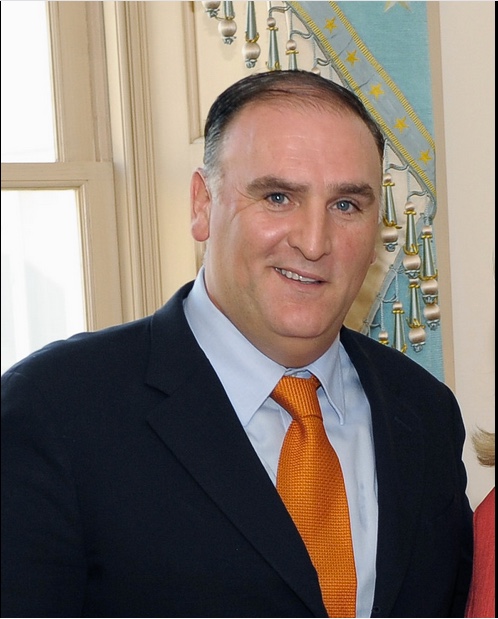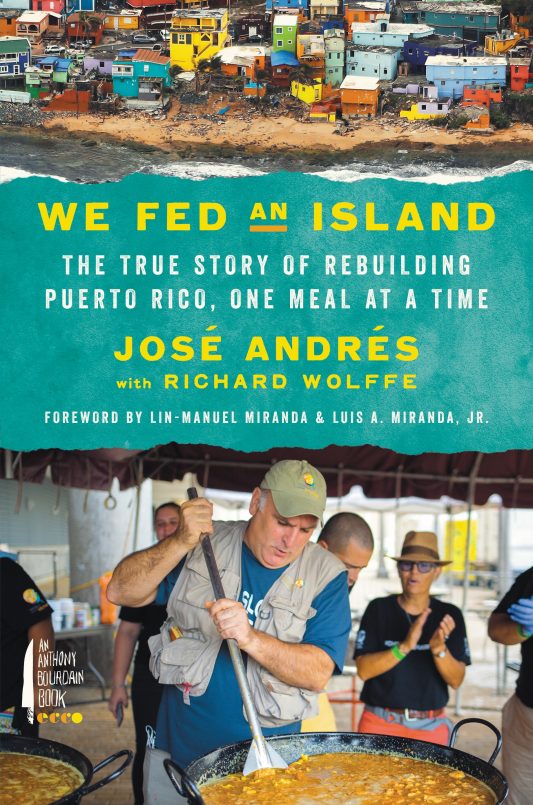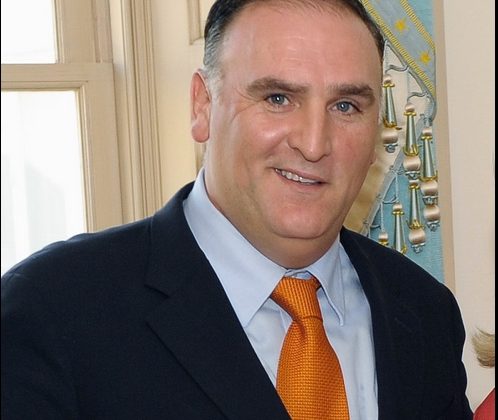We Fed An Island
“Too often charity is about the redemption of the giver, not the liberation of the receiver.” – Roger Egger, founder and President of L.A. Kitchen

Chef Jose Andres
There was no television at Casa Carmelita – even if there had been, I don’t understand enough Spanish to follow anything that would have been on the screen. And because my casita was situated away from the main house – and behind a stone wall – my Internet access was pretty much non-existent, too, once I retired for the evening. That led to the old-fashioned way of spending the evening – reading. Fortunately, I had brought along a very engaging book, which I was able to get through pretty quickly – We Fed an Island: The True Story of Rebuilding Puerto Rico, One Meal at a Time by renown, James Beard Award winning chef, Jose Andres.
While this blog has never been merely a recipe blog, I have been thinking for over a year now, that it needs to begin to address more ways that food brings up together in the age of Trumpism (and I know I am not the only one) we find ourselves in. This book came along to kick start me in that direction. I believe good food supports life, nurtures life and should reflect, and be reflected in every area of life.
Andres states early on that, “Cooking food is one of the very few features of human life that makes us different from other animals. ” He goes on to list the ways we evolved as a species by cooking, sharing food and communicating around eating together, and to state that “…we also need food to represent something more than food, if we are to rebuild our lives. Meals need to be cooked for our communities to come back together.” So he caught my attention right away.
The book chronicles his journey of building a massive relief operation in Puerto Rico following Hurricane Maria, with very little help (in fact, with a good bit of resistance and obstruction from the government agencies tasked with dealing with the aftermath of natural disasters), and very few resources, initially, by in part, taking advantage of what infrastructure (human and otherwise) was available to them right there on the island. He started not with a plan, but merely with the simple goal – a heart driven goal – of feeding people.
As almost all reasonable people now believe that we are headed for more of these disasters, it’s vital we listen to this man’s experiences, who believes a new model of disaster relief and food aid is badly needed – one that understands the needs and desires of the receiver. “We know where the hurricanes, tornadoes and earthquakes strike.” Andres says. “We know there will be more of them as the climate continues to change before our eyes. And we know that the first few days after a catastrophe are critical in terms of food and water… We need a network of Food First Responders…”
Andres describes what he (and his crew that grew as it went along) did as “embracing complexity every single second – not planning, not meeting, just improvising.” And I might add, not waiting for permission of a government or NGO bureaucracy. “It had to do with the idea that under situations of complexity, you want to distribute power out to the periphery as much as possible.”
And of course, he reminds us that “after the wars in Afghanistan, politicians liked to say they wanted to see nation-building at home. Well, Puerto Rico is home and it needs to be built.”
There’s so much good here. I urge you to pick up a copy of this vitally important book, at this moment when we have just closed out another very damaging hurricane season. All of the author’s net proceeds go to the Chef Relief Network of World Central Kitchen, an organization founded by Andres, for efforts in Puerto Rico and beyond.








3 Comments
Hi, Gisele
I did hear a lot about the unmet needs of the people in Puerto Rico after the hurricane. Thanks for highlighting this author and his mission.
Adrian
November 15, 2018
Hello again!
I finished reading the book. The mistreatment of the people of Puerto Rico by our government are often discussed in the media. What resonated with me is Jose Andres’s comments about the Red Cross. I do remember apologies issued by the Red Cross following other disasters, justifications similar to these described in this book: Red Cross fundraises for specific disasters and will not spend more regardless. Ever since, I looked for other outlets for my charity.
Thanks again for giving me the opportunity to better understand the plight of the Puerto Rico people and the dynamic personality of Jose Andres.
November 19, 2018
Yes, Adrian,
I definitely think there are more grassroots organizations, where a larger percent of money goes directly to relief than the Red Cross.
G.
November 19, 2018